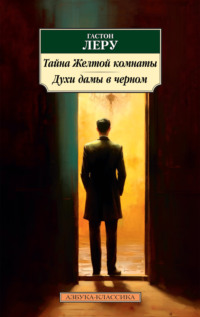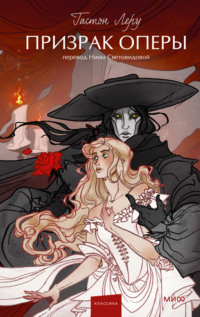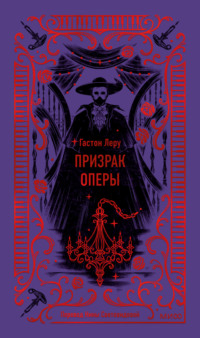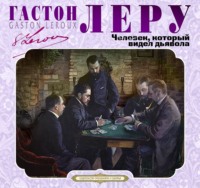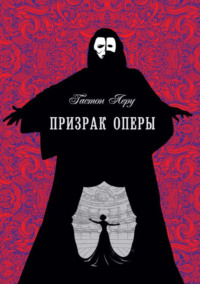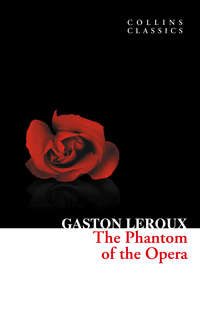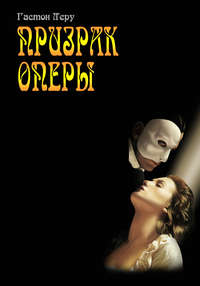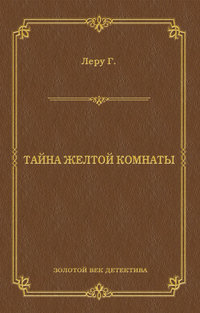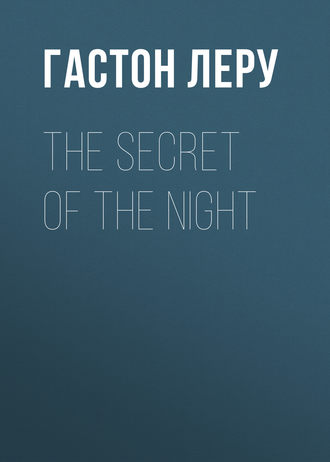 полная версия
полная версияThe Secret of the Night
“But you, how have you been able to penetrate into this guarded secret?”
“By watching her eyes. By observing, when she believed herself alone, the look of terror and the gleams of love. And, beyond all, by looking at her when she was looking at her father. Ah, Sire, there were moments when on her mystic face one could read the wild joy and devotion of the martyr. Then, by listening and by piecing together scraps of phrases inconsistent with the idea of treachery, but which immediately acquired meaning if one thought of the opposite, of sacrifice. Ah, that is it, Sire! Consider always the alternative motive. What I finally could see myself, the others, who had a fixed opinion about Natacha, could not see. And why had they their fixed opinion? Simply because the idea of compromise with the Nihilists aroused at once the idea of complicity! For such people it is always the same thing—they never can see but the one side of the situation. But, nevertheless, the situation had two sides, as all situations have. The question was simple. The compromise was certain. But why had Natacha compromised herself with the Nihilists? Was it necessarily in order to lose her father? Might it not be, on the contrary, in order to save him? When one has rendezvous with an enemy it is not necessarily to enter into his game, sometimes it is to disarm him with an offer. Between these two hypotheses, which I alone took the trouble to examine, I did not hesitate long, because Natacha’s every attitude proclaimed her innocence: and her eyes, Sire, in which one read purity and love, prevailed always with me against all the passing appearances of disgrace and crime.
“I saw that Natacha negotiated with them. But what had she to place in the scales against the life of her father? Nothing—except the fortune that she would have one day.
“Some words she spoke about the impossibility of immediate marriage, about poverty which could always knock at the door of any mansion, remarks that I was able to overhear between Natacha and Boris Mourazoff, which to him meant nothing, put me definitely on the right road. And I was not long in ascertaining that the negotiations in this formidable affair were taking place in the very house of Trebassof! Pursued without by the incessant spying of Koupriane, who sought to surprise her in company with the Nihilists, watched closely, too, by the jealous supervision of Boris, who was jealous of Michael Nikolaievitch, she had to seize the only opportunities possible for such negotiations, at night, in her own home, the sole place where, by the very audacity of it, she was able to play her part in any security.
“Michael Nikolaievitch knew Annouchka. There was certainly the point of departure for the negotiations which that felon-officer, traitor to all sides, worked at will toward the realization of his own infamous project. I do not think that Michael ever confided to Natacha that he was, from the very first, the instrument of the revolutionaries. Natacha, who sought to get in touch with the revolutionary party, had to entrust him with a correspondence for Annouchka, following which he assumed direction of the affair, deceiving the Nihilists, who, in their absolute penury, following the revolt, had been seduced by the proposition of General Trebassof’s daughter, and deceiving Natacha, whom he pretended to love and by whom he believed himself loved. At this point in the affair Natacha came to understand that it was necessary to propitiate Michael Nikolaievitch, her indispensable intermediary, and she managed to do it so well that Boris Mourazoff felt the blackest jealousy. On his side, Michael came to believe that Natacha would have no other husband than himself, but he did not propose to marry a penniless girl! And, fatally, it followed that Natacha, in that infernal intrigue, negotiated for the life of her father through the agency of a man who, underhandedly, sought to strike at the general himself, because the immediate death of her father before the negotiation was completed would enrich Natacha, who had given Michael so much to hope. That frightful tragedy, Sire, in which we have lived our most painful hours, appeared to me, confident of Natacha’s innocence, as absolutely simple as for the others it seemed complicated. Natacha believed she had in Michael Nikolaievitch a man who worked for her, but he worked only for himself. The day that I was convinced of it, Sire, by my examination of the approach to the balcony, I had a mind to warn Natacha, to go to her and say, ‘Get rid of that man. He will betray you. If you need an agent, I am at your service.’ But that day, at Krestowsky, destiny prevented my rejoining Natacha; and I must attribute it to destiny, which would not permit the loss of that man. Michael Nikolaievitch, who was a traitor, was too much in the ‘combination,’ and if he had been rejected he would have ruined everything. I caused him to disappear! The great misfortune then was that Natacha, holding me responsible for the death of a man she believed innocent, never wished to see me again, and, when she did see me, refused to have any conversation with me because I proposed that I take Michael’s place for her with the revolutionaries. She would have nothing to do with me in order to protect her secret. Meantime, the Nihilists believed they were betrayed by Natacha when they learned of the death of Michael, and they undertook to avenge him. They seized Natacha, and bore her off by force. The unhappy girl learned then, that same evening, of the attack which destroyed the datcha and, happily, still spared her father. This time she reached a definite understanding with the revolutionary party. Her bargain was made. I offer you for proof of it only her attitude when she was arrested, and, even in that moment, her sublime silence.”
While Rouletabille urged his view, the Emperor let him talk on and on, and now his eyes were dim.
“Is it possible that Natacha has not been the accomplice, in all, of Michael Nikolaievitch?” he demanded. “It was she who opened her father’s house to him that night. If she was not his accomplice she would have mistrusted him, she would have watched him.”
“Sire, Michael Nikolaievitch was a very clever man. He knew so well how to play upon Natacha, and Annouchka, in whom she placed all her hope. It was from Annouchka that she wished to hold the life of her father. It was the word, the signature of Annouchka that she demanded before giving her own. The evening Michael Nikolaievitch died, he was charged to bring her that signature. I know it, myself, because, pretending drunkenness, I was able to overhear enough of a conversation between Annouchka and a man whose name I must conceal. Yes, that last evening, Michael Nikolaievitch, when he entered the datcha, had the signature in his pocket, but also he carried the weapon or the poison with which he already had attempted and was resolved to reach the father of her whom he believed was assuredly to be his wife.”
“You speak now of a paper, very precious, that I regret not to possess, monsieur,” said the Tsar coldly, “because that paper alone would have proved to me the innocence of your protegee.”
“If you have not it, Sire, you know well that it is because I have wished you to have it. The corpse had been searched by Katharina, the little Bohemian, and I, Sire, prevented Koupriane from finding that signature in Katharina’s possession. In saving the secret I have saved General Trebassof’s life, who would have preferred to die rather than accept such an arrangement.”
The Tsar stopped Rouletabille in his enthusiastic outburst.
“All that would be very beautiful and perhaps admirable,” said he, more and more coldly, because he had entirely recovered himself, “if Natacha had not, herself, with her own hand, poisoned her father and her step-mother!—always with arsenate of soda.”
“Oh, some of that had been left in the house,” replied Rouletabille. “They had not given me all of it for the analysis after the first attempt. But Natacha is innocent of that, Sire. I swear it to you. As true as that I have certainly escaped being hanged.”
“How, hanged?”
“Oh, it has not amounted to much now, Your Majesty.”
And Rouletabille recounted his sinister adventure, up to the moment of his death, or, rather, up to the moment when he had believed he was going to die.
The Emperor listened to the young reporter with complete stupefaction. He murmured, “Poor lad!” then, suddenly:
“But how have you managed to escape them?”
“Sire they have given me twenty-four hours for you to set Natacha at liberty, that is to say, that you restore her to her rights, all her rights, and she be always the recognized heiress of Trebassof. Do you understand me, Sire?
“I will understand you, perhaps, when you have explained to me how Natacha has not poisoned her father and step-mother.”
“There are some things so simple, Sire, that one is able to think of them only with a rope around one’s neck. But let us reason it out. We have here four persons, two of whom have been poisoned and the other two with them have not been. Now, it is certain that, of the four persons, the general has not wished to poison himself, that his wife has not wished to poison the general, and that, as for me, I have not wished to poison anybody. That, if we are absolutely sure of it, leaves as the poisoner only Natacha. That is so certain, so inevitable, that there is only one case, one alone, where, in such conditions, Natacha would not be regarded as the poisoner.”
“I confess that, logically, I do not see,” said the Tsar, “anything beyond that but more and more of a tangle. What is it?”
“Logically, the only case would be that where no one had been poisoned, that is to say, where no one had taken any poison.”
“But the presence of the poison has been established!” cried the Emperor.
“Still, the presence of the poison proves only its presence, not the crime. Both poison and ipecac were found in the stomach expulsions. From which a crime has been concluded. What state of affairs was necessary for there to have been no crime? Simply that the poison should have appeared in the expulsions after the ipecac. Then there would have been no poisoning, but everyone would believe there had been. And, for that, someone would have poured the poison into the expulsions.”
The Tsar never quitted Rouletabille’s eyes.
“That is extraordinary,” said he. “But of course it is possible. In any case, it is still only an hypothesis.
“And so long as it could be an hypothesis that no one thought of, it could be just that, Sire. But if I am here, it is because I have the proof that that hypothesis corresponds to the reality. That necessary proof of Natacha’s innocence, Your Majesty, I have found with the rope around my neck. Ah, I tell you it was time! What has hindered us hitherto, I do not say to realize, but even to think, of that hypothesis? Simply that we thought the illness of the general had commenced before the absorption of the ipecac, since Matrena Petrovna had been obliged to go for it to her medicine-closet after his illness commenced, in order to counteract the poison of which she also appeared to be the victim.
“But, if I acquire proof that Matrena Petrovna had the ipecac at hand before the sickness, my hypothesis of pretense at poisoning has irresistible force. Because, if it was not to use it before, why did she have it with her before? And if it was not that she wished to hide the fact that she had used it before, why did she wish to make believe that she went to find it afterwards?
“Then, in order to show Natacha’s innocence, here is what must be proved: that Matrena Petrovna had the ipecac on her, even when she went to look for it.”
“Young Rouletabille, I hardly breathe,” said the Tsar.
“Breathe, Sire. The proof is here. Matrena Petrovna necessarily had the ipecac on her, because after the sickness she had not the time for going to find it. Do you understand, Sire? Between the moment when she fled from the kiosk and when she returned there, she had not the actual time to go to her medicine-closet to find the ipecac.”
“How have you been able to compute the time?” asked the Emperor.
“Sire, the Lord God directed, Who made me admire Feodor Feodorovitch’s watch just when we went to read, and to read on the dial of that watch two minutes to the hour, and the Lord God directed yet, Who, after the scene of the poison, at the time Matrena returned carrying the ipecac publicly, made the hour strike from that watch in the general’s pocket.
“Two minutes. It was impossible for Matrena to have covered that distance in two minutes. She could only have entered the deserted datcha and left it again instantly. She had not taken the trouble to mount to the floor above, where, she told us and repeated when she returned, the ipecac was in the medicine-closet. She lied! And if she lied, all is explained.
“It was the striking of a watch, Sire, with a striking apparatus and a sound like the general’s, there in the quarters of the revolutionaries, that roused my memory and indicated to me in a second this argument of the time.
“I got down from my gallows-scaffold, Your Majesty, to experiment on that time-limit. Oh, nothing and nobody could have prevented my making that experiment before I died, to prove to myself that Rouletabille had all along been right. I had studied the grounds around the datcha enough to be perfectly exact about the distances. I found in the court where I was to be hanged the same number of steps that there were from the kiosk to the steps of the veranda, and, as the staircase of the revolutionaries had fewer steps, I lengthened my journey a few steps by walking around a chair. Finally, I attended to the opening and closing of the doors that Matrena would have had to do. I had looked at a watch when I started. When I returned, Sire, and looked at the watch again, I had taken three minutes to cover the distance—and it is not for me to boast, but I am a little livelier than the excellent Matrena.
“Matrena had lied. Matrena had simulated the poisoning of the general. Matrena had coolly poured ipecac in the general’s glass while we were illustrating with matches a curious-enough theory of the nature of the constitution of the empire.”
“But this is abominable!” cried the Emperor, this time definitely convinced by the intricate argument of Rouletabille. “And what end could this imitation serve?’”
“The end of preventing the real crime! The end that she believed herself to have attained, Sire, to have Natacha removed forever—Natacha whom she believed capable of any crime.”
“Oh, it is monstrous! Feodor Feodorovitch has often told me that Matrena loved Natacha sincerely.”
“She loved her sincerely up to the day that she believed her guilty. Matrena Petrovna was sure of Natacha’s complicity in Michael Nikolaievitch’s attempt to poison the general. I shared her stupor, her despair, when Feodor Feodorovitch took his daughter in his arms after that tragic night, and embraced her. He seemed to absolve her. It was then that Matrena resolved within herself to save the general in spite of himself, but I remain persuaded that, if she had dared such a plan against Natacha, it would only be because of what she believed definite proof of her step-daughter’s infamy. These papers, Sire, that you have shown me, and which show, if nothing more, an understanding between Natacha and the revolutionaries, could only have been in the possession of Michael or of Natacha. Nothing was found in Michael’s quarters. Tell me, then, that Matrena found them in Natacha’s apartment. Then, she did not hesitate!”
“If one outlined her crime to her, do you believe she would confess it? asked the Emperor.
“I am so sure of it that I have had her brought here. By now Koupriane should be here at the chateau, with Matrena Petrovna.”
“You think of everything, monsieur.”
The Tsar moved to ring a bell. Rouletabille raised his hand.
“Not yet, Sire. I ask that you permit me not to be present at the confusion of that brave, heroic, good woman who has loved me much. But before I go, Sire—do you promise me?”
The Emperor believed he had not heard correctly or did not grasp the meaning. He repeated what Rouletabille had said. The young reporter repeated it once more:
“Do you promise? No, Sire, I am not mad. I dare to ask you that. I have confided my honor to Your Majesty. I have told you Natacha’s secret. Well, now, before Matrena’s confession, I dare to ask you: Promise me to forget that secret. It will not suffice merely to give Natacha back again to her father. It is necessary to leave her course open to her—if you really wish to save General Trebassof. What do you decide, Sire?”
“It is the first time anyone has questioned me, monsieur.”
“Ah, well, it will be the last. But I humbly beg Your Majesty to reply.”
“That would be many millions given to the Revolution.”
“Oh, Sire, they are not given yet. The general is sixty-five, but he has many years ahead of him, if you wish it. By the time he dies—a natural death, if you wish it—your enemies will have disarmed.”
“My enemies!” murmured the Tsar in a low voice. “No, no; my enemies never will disarm. Who, then, will be able to disarm them?” added he, melancholily, shaking his head.
“Progress, Sire! If you wish it.”
The Tsar turned red and looked at the audacious young man, who met the gaze of His Majesty frankly.
“It is kind of you to say that, my young friend. But you speak as a child.”
“As a child of France to the Father of the Russian people.”
It was said in a voice so solemn and, at the same time, so naively touching, that the Tsar started. He gazed again for some time in silence at this boy who, this time, turned away his brimming eyes.
“Progress and pity, Sire.”
“Well,” said the Emperor, “it is promised.”
Rouletabille was not able to restrain a joyous movement hardly in keeping.
“You can ring now, Sire.”
And the Tsar rang.
The reporter passed into a little salon, where he found the Marshal, Koupriane and Matrena Petrovna, who was “in a state.”
She threw a suspicious glance at Rouletabille, who was not treated this morning as the dear little domovoi-doukh. She permitted herself to be conducted, already trembling, before the Emperor.
“What happened?” asked Koupriane agitatedly.
“It so happened, my dear Monsieur Koupriane, that I have the pardon of the Emperor for all the crimes you have charged against me, and that I wish to shake hands before I go, without any rancor. Monsieur Koupriane, the Emperor will tell you himself that General Trebassof is saved, and that his life will never be in danger any more. Do you know what follows? It follows that you must at once set Matiew free, whom I have taken, if you remember, under my protection. Tell him that he is going to make his way in France. I will find him a place on condition that he forgets certain lashes.”
“Such a promise! Such an attitude toward me!” cried Koupriane. “But I will wait for the Emperor to tell me all these fine things. And your Natacha, what do you do with her?”
“We release her also, monsieur. Natacha never has been the monster that you think.”
“How can you say that? Someone at least is guilty.”
“There are two guilty. The first, Monsieur le Marechal.”
“What!” cried the Marshal.
“Monsieur le Marechal, who had the imprudence to bring such dangerous grapes to the datcha des Iles, and—and—”
“And the other?” asked Koupriane, more and more anxiously.
“Listen there,” said Rouletabille, pointing toward the Emperor’s cabinet.
The sound of tears and sobs reached them. The grief and the remorse of Matrena Petrovna passed the walls of the cabinet. Koupriane was completely disconcerted.
Suddenly the Emperor appeared. He was in a state of exaltation such as had never been known in him. Koupriane, dismayed, drew back.
“Monsieur,” said the Tsar to him, “I require that Natacha Feodorovna be here within the next two hours, and that she be conducted with the honors due to her rank. Natacha is innocent, and we must make reparation to her.”
Then, turning toward Rouletabille:
“I have learned what she knows and what she owes to you—we owe to you, my young friend.”
The Tsar said “my young friend.” Rouletabille, at this last moment before his departure, spoke Russian?
“Then she knows nothing, Sire. That is better, Sire, because Your Majesty and me, we must forget right from to-day that we know anything.”
“You are right,” said the Tsar thoughtfully. “But, my friend, what am I to do for you?”
“Sire, one favor. Do not let me miss the train at 10:55.”
And he threw himself on his knees.
“Remain on your knees, my friend. You are ready, thus. Monsieur le Marechal will prepare at once a brevet, which I will immediately sign. Meantime, Monsieur le Marechal, find me, in my own closet, one of my St. Anne’s collars.”
And it was thus that Joseph Rouletabille, of “L’Epoque,” was created officer of St. Anne of Russia by the Emperor himself, who gave him the accolade.
“They combine the whole course of time in this country,” thought Rouletabille, pressing his hand to his eyes to hold back the tears.
For the train at 10:55 everybody had crowded at Tsarskoie-Coelo station. Among those who had come from St. Petersburg to press the young reporter’s hand when they learned of his impending departure were Ivan Petrovitch, the jolly Councilor of the Emperor, and Athanase Georgevitch, the lively advocate so well known for his famous exploits with knife and fork. They had come naturally with all their bandages and dressings, which made them look like glorious ruins. They brought the greetings of Feodor Feodorovitch, who still had a little fever, and of Thaddeus Tchitchnikoff, the Lithuanian, who had both legs broken.
Even after he was in his compartment Rouletabille had to drink his last drink of champagne. When nothing remained in the bottle and everyone had embraced and re-embraced him, as the train did not start quite yet, Athanase Georgevitch opened a second “last” bottle. It was then that Monsieur le Grand Marechal arrived, out of breath. They invited him to drink, and he accepted. But he had need to speak to Rouletabille in private, and he drew the reporter, after excuses, out into the corridor.
“It is the Emperor himself who has sent me,” said the high dignitary with emotion. “He has sent me about the eider downs. You forgot to explain the eider downs to him.”
“Niet!” replied Rouletabille, laughing. “That is nothing. Nitchevo! His Majesty’s eider downs are of the finest eider, as one of the feathers that you have shown me demonstrates. Well, open them now. They are a cheap imitation, as the second feather proves. The return of the false eider downs, before evening, proves then that they hoped the substitution would pass undetected. That is all. Caracho! Collapse of the hoax. Your health! Vive le Tsar!”
“Caracho! Caracho!”
The locomotive was puffing when a couple were seen running, a man and a woman. It was Monsieur and Madame Gounsovski.
Gounsovski stood on the running-board.
“Madame Gounsovski has insisted upon shaking hands. You are very congenial.”
“Compliments, madame.”
“Tell me, young man, you did wrong to fail for dinner at my house yesterday.”
“I would have certainly escaped a disagreeable little journey into Finland. I do not regret it, monsieur.”
The train trembled and moved. They cried, “Vive la France! Vive la Russe!” Athanase Georgevitch wept. Matrena Petrovna, at a window of the station, whither she had timidly retired, waved a handkerchief to the little domovoi-doukh, who had made her see everything in the right light, and whom she did not dare to embrace after the terrible affair of the false poison and the Tsar’s anger.
The reporter threw her a respectful kiss.
As he said to Gounsovski, there was nothing to be regretted.
All the same, as the train took its way toward the frontier, Rouletabille threw himself back on the cushions, and said:
“Ouf!”
1
The “Barque” is a restaurant on a boat, among the isles, near the Gulf of Finland, on a bank of the Neva.]
2
In this story according to Russian habit General Trebassof is called alternately by that name or the family name Feodor Feodorovitch, and Madame Trebassof by that name or her family name, Matrena Petrovna.—Translator’s Note.
3
Actual attack on Witte.


